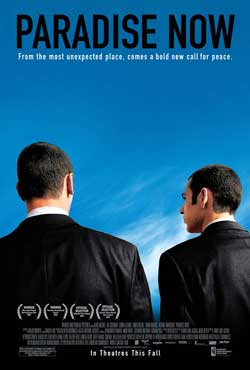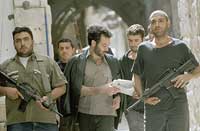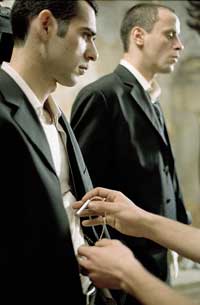 In Paradise Now two seemingly normal, every day slacker types are recruited to become suicide bombers in Israel. The film follows them from their selection, their preparation and their entry into Israel – where things go wrong. Will they be able to finish their mission? And will they want to?
In Paradise Now two seemingly normal, every day slacker types are recruited to become suicide bombers in Israel. The film follows them from their selection, their preparation and their entry into Israel – where things go wrong. Will they be able to finish their mission? And will they want to?
As you can tell, Paradise Now isn’t exactly your every day buddy action film. Palestinian writer and director Hany Abu-Assad has attempted to paint a realistic portrait of the final hours of a suicide bomber (I refuse to say homicide bomber, unless someone convinces me that there are also "injury bombers" and "minor inconvenience bombers" out there as well), and he even filmed some of the movie in Israel.
He recently came to New York to talk to the press and I had an opportunity to sit down with him and discuss not just the movie but the endless cycle of violence between Palestine and Israel.
Paradise Now is currently playing in New York and Los Angeles. It will be opening in the top 25 markets over the next few weeks.
Q: How hard was it to get permits to shoot in Tel Aviv?
Abu-Assad: In general we had somebody who was dealing with this. I wasn’t involved with it directly. A lot of negotiations. But I didn’t deal with it, so I don’t know exactly what they did to allow us to enter.
Q: Did they know what the movie was about when they allowed you to shoot there?
Abu-Assad: I think, yes. But we had a very smart production manager. He knew how to manipulate! He always managed to find a way.
Q: Your location manager was kidnapped.
Abu-Assad: Yes. Nablus, the place is still, this moment, under siege. People can’t go in and out with the permission of the Israeli army. That makes such a place unhealthy. People become paranoid. I became paranoid after five months. I started to think that somebody from the crew spied on me. You become very paranoid.
One of the senior [Palestinian] factions thought we were making something against the Palestinian cause, or heroes. They kidnapped our managers. Another faction, they call themselves Freedom Fighters, they want to fight for democracy and freedom, they just protected us. It was very difficult to be between two factions that are fighting and you’re in the middle, trying to survive.
 Q: The Freedom Fighters provided you the location where you shot the martyr video?
Q: The Freedom Fighters provided you the location where you shot the martyr video?
Abu-Assad: Yes. When we were shooting the footage of the martyr video they were around us. I was very afraid actually that they were going to interfere, because they felt maybe that the scene wasn’t in their taste. They did interfere, but they interfere on how the actor should carry the weapon. That told me that the content of the scene was very close to reality and that I could be sure that every detail was done its authentic way.
Q: Do you think a movie can change someone’s mind on this subject? What do you see as the purpose of film?
Abu-Assad: Not to change. If you’re already open-minded it adds a new vision, or to see the world from a different point of view. Movies, generally, lets you experience things you can’t experience in reality, whether it’s to go to a place you can’t go or go to somewhere inside you you can’t go. A film allows you to experience this in your comfortable chair in the cinema. But it also allows you to see things from a different point of view. It allows you to show how complex characters can be, how complex life can be, how complex the subject can be. It allows you to see the complexity of things.
But it’s not my goal to change [your mind]. My goal is first of all to fulfill my own curiosity. I want to know what this is about.
Q: One of the things I was most impressed with was that the two main characters don’t begin the film seemingly like the kind of fanatics I would assume become suicide bombers. Do you think audiences are going to also be surprised to see that?
Abu-Assad: I was first of all surprised during my research that I found so many stories that are so human stories. I couldn’t believe it. I couldn’t believe these stories happened. One story I heard from a lawyer who is defending people who failed in their mission and he is now defending them, it was a boy and a girl sitting in the car and they both had a belt. When the boy discovered that she would also do a suicide mission with him, he said, no stop, I don’t want to do it with a girl. She was angry with him – ‘Why? You are a conservative man!’ He said, ‘No, a man can kill for protection, but when a woman kills, that’s the end of life. You have to create life.’ This is a real story, happened in the car while on their way to do. They had a discussion with the modern idea of equality between man and woman! They were fighting and the driver was saying, ‘Can you shut up?’
This was a real story. The kind of stories I was getting from the lawyer was surprising me with this humanity. And then I was surprised at how ignorant I was to think that they weren’t human beings, that they were different from me and you. Then what I discovered is that everybody can become a suicide bomber if he can get the same situation. And the most horrible situation is that you accuse these Palestinians of being a threat when they are just living there. This makes them insane – not everybody, but some of them, which I can understand. And I am a Palestinian and I was angry with myself for not knowing these stories.
The deed is inhuman, but they are human beings.
Q: Suicide bombings have gone on for so long – do you think that there is ever a point when they’ll actually work?
Abu-Assad: This is a military strategy. I think this will make the situation worse. It will not solve the situation. First of all you kill yourself with other victims – who is driving the bus, who is on the bus? Poor people. The poor people from Palestinian society is killing themselves with the poor people of the other society. They are not killing the people responsible for the policy.
Secondly, you are letting the other side misuse your action to spread fear in their own society and continue the injustice against you.
society and continue the injustice against you.
Last thing, I will be against it even if I will be in favor of a military action. I am against it because you are losing the best soldier on your side. Somebody who is willing to die for your cause is the best soldier you have. You are letting him be killed in a place to kill the cheapest people on the other side, from a military point of view. So I will never be in favor of these kinds of actions. Again, I am speaking from military.
Q: In the scene where the martyr videos are being filmed, the cameras don’t work, the militants are hanging out eating sandwiches – were you looking to add humor to the film, or does that really happen so matter of factly?
Abu-Assad: Actually when somebody is recording the speech that he wants to do a suicide action, he’s signing the contracts. Like if you buy a house you are negotiating all the time, but suddenly when you sign the contract it is yours. And when you are recording now on tape that you want to do it, it is an emotional turning point.
This emotional turning point you can use in narrative structures to shift the film to a different level. You take it from a tragedy to a comedy, from a boring genre to a thriller. But also to give the scene a sense of reality because in real life you have tragedy and comedy besides each other. You suffer and at the same time have hope.
These things all together can give the film a look of reality. But also the real people were looking on when we shot the scene but they didn’t protest while we did it. You know why? I think this is how they do it because they don’t want to make from it a holy moment because they are afraid that at this moment when you are signing the contract you will step back. They don’t want you to step back so they make from it no big deal, they make it like a soldier just going forward.
Q: It seems to me that there are a lot of misunderstandings in America about the Palestinian cause. But I wonder if that goes both ways – while the US government may support Israel there are many Americans who support Palestine. Are the Palestinians aware that there are Americans who support their cause?
Abu-Assad: Yes, for sure. Most Palestinians know that the world at this moment has no interest in solving this. It’s not difficult to understand what’s going on. You have two nations and one nation is oppressing the other because they think the Jewish state is more important than the human rights and civil rights of the Palestinians. To solve that is easy – the one oppressing you have to force to treat everyone equal. Most of the intelligent people in the world know this is the case. But the powers now have no interest in solving this, for lots of reasons – oil, the holocaust. But this power is not representative for America. And not representative for most of Israel. I think most Israelis are victims of this policy also because it is making an unhealthy society. Israeli society is unhealthy like the Palestinian society.
In general, I don’t know when they’re going to solve this – but not in the coming few years.